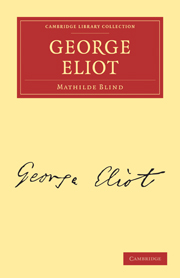Book contents
- Frontmatter
- PREFATORY NOTE
- Contents
- CHAPTER I INTRODUCTORY
- CHAPTER II CHILDHOOD AND EARLY HOME
- CHAPTER III YOUTHFUL STUDIES AND FRIENDSHIPS
- CHAPTER IV TRANSLATION OF STRAUSS AND FEUERBACH — TOUR ON THE CONTINENT
- CHAPTER V THE “WESTMINSTER REVIEW”
- CHAPTER VI GEORGE HENRY LEWES
- CHAPTER VII SCENES OF CLERICAL LIFE
- CHAPTER VIII ADAM BEDE
- CHAPTER IX THE MILL ON THE FLOSS
- CHAPTER X SILAS MARNER
- CHAPTER XI ROMOLA
- CHAPTER XII HER POEMS
- CHAPTER XIII FELIX HOLT AND MIDDLEMARCH
- CHAPTER XIV DANIEL DERONDA
- CHAPTER XV LAST YEARS
- THE PROPHECY OF SAINT ORAN: AND OTHER POEMS
CHAPTER I - INTRODUCTORY
Published online by Cambridge University Press: 07 September 2011
- Frontmatter
- PREFATORY NOTE
- Contents
- CHAPTER I INTRODUCTORY
- CHAPTER II CHILDHOOD AND EARLY HOME
- CHAPTER III YOUTHFUL STUDIES AND FRIENDSHIPS
- CHAPTER IV TRANSLATION OF STRAUSS AND FEUERBACH — TOUR ON THE CONTINENT
- CHAPTER V THE “WESTMINSTER REVIEW”
- CHAPTER VI GEORGE HENRY LEWES
- CHAPTER VII SCENES OF CLERICAL LIFE
- CHAPTER VIII ADAM BEDE
- CHAPTER IX THE MILL ON THE FLOSS
- CHAPTER X SILAS MARNER
- CHAPTER XI ROMOLA
- CHAPTER XII HER POEMS
- CHAPTER XIII FELIX HOLT AND MIDDLEMARCH
- CHAPTER XIV DANIEL DERONDA
- CHAPTER XV LAST YEARS
- THE PROPHECY OF SAINT ORAN: AND OTHER POEMS
Summary
Speaking of the contributions made to literature by her own sex, George Eliot, in a charming essay written in 1854, awards the palm of intellectual pre-eminence to the women of France. “They alone,” says the great English author, “have had a vital influence on the development of literature. For in France alone the mind of woman has passed, like an electric current, through the language, making crisp and definite what is elsewhere heavy and blurred; in France alone, if the writings of women were swept away, a serious gap would be made in the national history.”
The reason assigned by George Eliot for this literary superiority of Frenchwomen consists in their having had the courage of their sex. They thought and felt as women, and when they wrote, their books became the fullest expression of their womanhood. And by being true to themselves, by only seeking inspiration from their own life-experience, instead of servilely copying that of men, their letters and memoirs, their novels and pictures have a distinct, nay unique, value, for the student of art and literature. Englishwomen, on the other hand, have not followed the spontaneous impulses of nature. They have not allowed free play to the peculiarly feminine element, preferring to mould their intellectual products on the masculine pattern. For that reason, says George Eliot, their writings are “usually an absurd exaggeration of the masculine style, like the swaggering gait of a bad actress in male attire.”
- Type
- Chapter
- Information
- George Eliot , pp. 1 - 8Publisher: Cambridge University PressPrint publication year: 2010First published in: 1883

